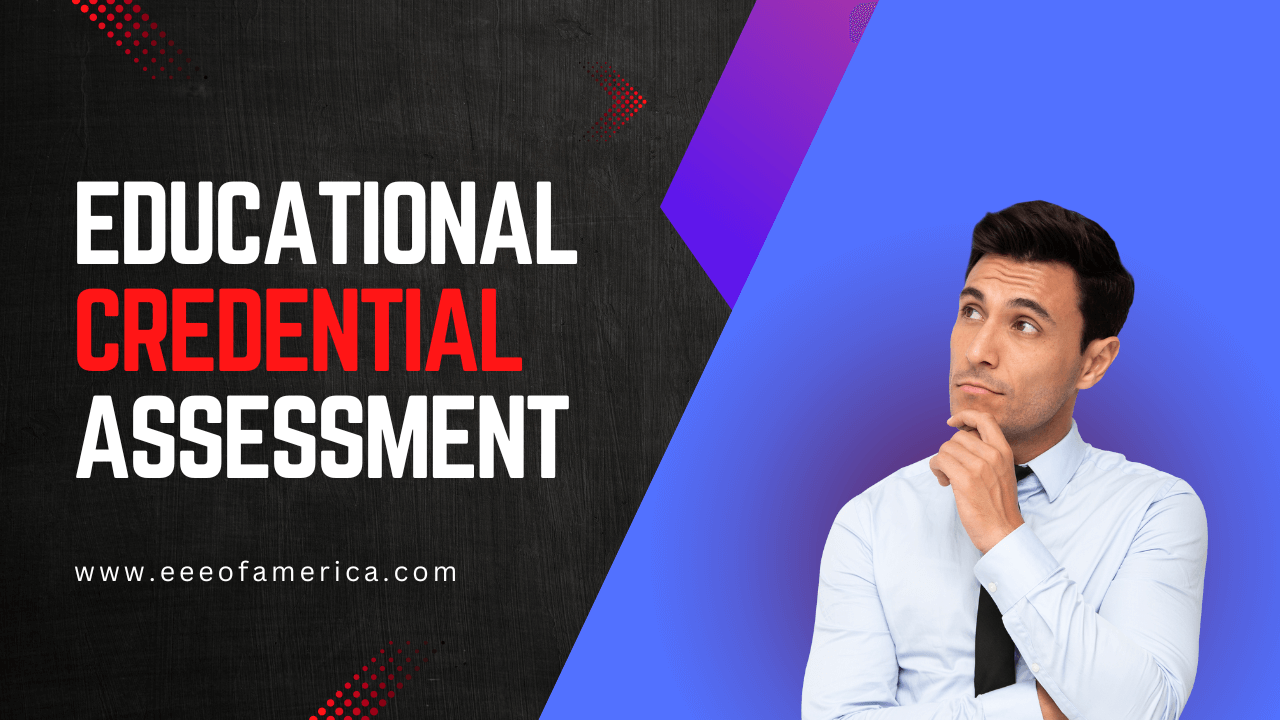Whether you are planning to pursue further education, secure employment, or obtain professional licenses, this guide will provide valuable insights to help you navigate the foreign education evaluation process.
Educational Credential Assessment
Before delving into the details, let’s begin with a clear understanding of what an educational credential assessment entails. At its core, an ECA verifies the validity and equivalency of your foreign degree, diploma, or certificate to a Canadian or U.S. qualification. This assessment is crucial for educational institutions, employers, and licensing bodies to determine the value of your international education.
Why Educational Credential Assessment Matters
Obtaining an educational credential assessment holds numerous benefits for individuals seeking to leverage their international education. Let’s explore why ECAs matter in different contexts:
Pursuing Further Education
If you aspire to pursue a graduate program or a professional course, an ECA serves as proof of your academic eligibility. Educational institutions rely on ECAs to evaluate your qualifications and ensure they align with their admission requirements.
Securing Employment
In many professions, employers require foreign education evaluations to assess whether your qualifications meet their job requirements. An ECA provides employers with valuable insights into the equivalency of your international education, increasing your chances of securing employment.
Obtaining Professional Licenses
For individuals planning to practice regulated professions, such as medicine or pharmacy, a foreign education evaluation is often a prerequisite for obtaining a professional license. Licensing bodies use ECAs to ensure that your qualifications align with the standards set in the country of practice.
Who Needs an Educational Credential Assessment?
Now that we’ve established the significance of educational credential assessments, let’s discuss who needs to obtain one:
Immigration Applicants
If you are applying for immigration to Canada or the United States, an ECA is a mandatory requirement. The immigration authorities use ECAs to assess the equivalency of your foreign qualifications and determine your eligibility for immigration programs such as Express Entry or H1B visas.
Individuals Seeking Employment
Individuals seeking employment in fields that require specific educational qualifications may need an ECA. Employers in regulated professions, such as engineering or nursing, often request ECAs to ensure that your qualifications meet their job requirements.
Professionals Seeking Licensing
Professionals planning to practice in a regulated field, such as medicine or pharmacy, need to obtain a professional license. Licensing bodies may require an ECA to assess the equivalency of your foreign qualifications before granting a license.
How to Obtain an Educational Credential Assessment
Now that you understand the importance of an educational credential assessment and who needs one, let’s explore the process of obtaining an ECA:
Choosing a Designated Organization
To obtain an ECA, you must choose a designated organization authorized by the immigration authorities. These organizations specialize in evaluating foreign credentials and providing comprehensive assessment reports. Some of the designated organizations include:
- Comparative Education Service – University of Toronto School of Continuing Studies
- International Credential Assessment Service of Canada
- World Education Services
- International Qualifications Assessment Service (IQAS)
- International Credential Evaluation Service – British Columbia Institute of Technology
When selecting a designated organization, consider factors such as reputation, accreditations, and specific requirements based on your intended occupation or institution.
Gathering Required Documents
Once you have chosen a designated organization, gather all the required documents for the assessment. These documents typically include your transcripts, diplomas, and other relevant educational certificates. If your documents are in a language other than English or French, you may need to provide translated versions prepared by certified translators.
Submitting Your Application
After gathering your documents, proceed to submit your application to the designated organization. The application process typically involves completing an application form and paying the necessary fees. Ensure that you carefully follow the instructions provided by the organization to avoid any delays in the evaluation process.
Evaluation Process
Once your application is submitted, the designated organization will initiate the evaluation process. This process involves a thorough analysis of your educational documents, comparing them to local educational qualifications. The organization will provide you with a detailed assessment report outlining the equivalency of your foreign credentials. This report serves as a valuable tool for educational institutions, employers, and licensing bodies to understand the value of your international education.
What Does Your ECA Report Mean?
Upon receiving your ECA report, it is essential to understand its implications and how it can be used:
Academic Eligibility
Education institutions rely on ECA reports to assess your academic eligibility for admission to their programs. The report provides valuable insights into the equivalency of your foreign qualifications, facilitating the admissions process.
Employment Opportunities
While an ECA report enhances your employability by demonstrating the equivalency of your qualifications, it does not guarantee employment in your field or at a specific level. Securing a job in your desired field depends on various factors, including market demand, skills, and experience.
Professional Licensing
For individuals seeking professional licensing, the ECA report plays a vital role in the registration process. Licensing bodies refer to the report to determine whether your foreign qualifications meet the standards required for practising the profession in the country of intended practice.
Section 6: Submitting Your ECA Report
Once you have received your ECA report, you must submit it through the appropriate channels:
6.1 Express Entry Profile
If you are applying for immigration through the Express Entry system in Canada, you must include your ECA report and reference number in your Express Entry profile. This ensures that the immigration authorities consider your educational qualifications during the selection process.
6.2 Employment Applications
When applying for jobs, particularly in regulated professions, you may need to submit your ECA report to potential employers. This report shows the equivalency of your qualifications, increasing your chances of securing employment.
Professional Licensing Applications
For individuals seeking professional licensing, submit your ECA report to the respective licensing body during the registration process. This allows the licensing body to assess the equivalency of your qualifications and determine your eligibility for a license.
The Benefits of an ECA in the Job Market
Having an ECA can provide significant advantages when navigating the job market:
Demonstrating Qualifications
An ECA report validates the equivalency of your foreign qualifications, making it easier for employers to understand your educational background. This enhances your chances of securing employment in your desired field.
Increased Job Opportunities
Having an ECA can open doors to a broader range of job opportunities. Employers in regulated professions often require ECAs to ensure candidates meet the necessary educational qualifications.
Competitive Advantage
In a competitive job market, an ECA can give you a competitive edge. It demonstrates to employers that your qualifications align with local standards, making you a desirable candidate for employment.
ECA Reports and Professional Licensing
For individuals seeking professional licensing, an ECA report is crucial. Here’s how it impacts the licensing process:
Assessing Qualifications
Licensing bodies refer to ECA reports to assess the equivalency of your foreign qualifications. This evaluation ensures that your educational background meets the standards required for practising the profession in the country of intended practice.
Registration Requirements
During the registration process, licensing bodies may require you to submit your ECA report as part of the application. This report serves as evidence that your qualifications align with the educational requirements set by the licensing body.
Facilitating Licensing Process
By providing an ECA report, you streamline the licensing process. The licensing body can efficiently assess the equivalency of your credentials, expediting the registration process and enabling you to practice your profession sooner.
ECA Reports and Further Education
An ECA report is a valuable asset if you plan to pursue further education. Here’s how it benefits your academic journey:
Admission Eligibility
Educational institutions use ECA reports to evaluate the equivalency of your foreign qualifications. This assessment determines your eligibility for admission to various programs, ensuring that you meet the academic requirements.
Credit Transfer
An ECA report can facilitate the credit transfer process. If you have completed previous educational qualifications abroad, the assessment report helps educational institutions determine the transferability of your credits.
Scholarship Opportunities
For individuals seeking scholarships or financial aid, an ECA report strengthens your application. It provides evidence of the equivalency of your foreign qualifications, increasing your chances of securing funding for your studies.
The Role of Designated Organizations
Designated organizations play a crucial role in the educational credential assessment process. Let’s explore their significance:
Evaluation Expertise
Designated organizations specialize in evaluating foreign credentials. They have the expertise and knowledge to assess the equivalency of your qualifications accurately.
Accreditation and Recognition
Designated organizations are recognized and accredited by the respective immigration authorities. Their evaluation reports are trusted and widely accepted by educational institutions, employers, and licensing bodies.
Specific Evaluation Types
Different designated organizations offer various evaluation types. Some organizations focus on course-by-course evaluations, while others provide general assessments. Consider your specific needs and requirements when choosing a designated organization.
EEE OF AMERICA: Your Trusted ECA Provider
When it comes to foreign credential evaluations, EEE OF AMERICA stands as a comprehensive and trusted provider. Our range of services includes Education Evaluations, Work Experience Evaluations, Position Evaluations, Expert Opinion Letters, and Certified Translations.
With years of experience and a team of experts, we have helped thousands of clients achieve their goals in various fields and industries. From immigration lawyers to educational institutions, our clients trust us to deliver accurate and reliable evaluation reports.
Section 12: Conclusion
In conclusion, obtaining an educational credential assessment is an essential step for individuals seeking to leverage their international education.
Whether you are planning to pursue further education, secure employment, or obtain professional licenses, an ECA provides valuable insights into the equivalency of your foreign qualifications.
By understanding the process, benefits, and significance of ECAs, you can navigate the global job market and educational landscape with confidence.
Trust a reputable designated organization like EEE OF AMERICA to ensure accurate and reliable evaluations that support your goals.




